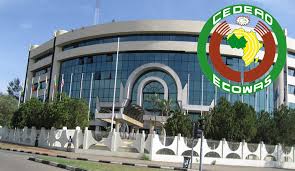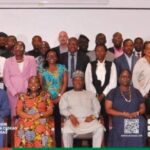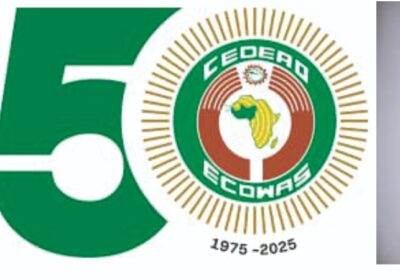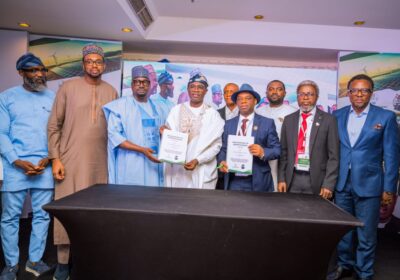ECOWAS at 50: A Legacy of Regional Unity and Integration, Challenges, and A Pathway Forward
By Raymond Enoch
A Golden Jubilee of Regional Cooperation has became a reality in 2025
Fifty years ago, on May 28, 1975, the Economic Community of West African States (ECOWAS) was founded through the Treaty of Lagos, heralding a new era of regional economic cooperation and stability. The vision was clear: to foster economic integration, enhance trade, and promote peace and security among the 15 member states.

As ECOWAS marks its golden jubilee, this moment presents an opportunity to reflect on its achievements, assess its challenges, and chart a course for the next phase of its evolution.
ECOWAS at 50: Impact and Achievements
Over the decades, ECOWAS has made remarkable strides in economic integration, security, and governance. Its role as a unifying force in West Africa has been tested by political instability and economic disparities, yet its resilience remains undeniable.
Economic Integration and Trade Facilitation
The ECOWAS Trade Liberalization Scheme (ETLS) has been a critical driver of regional economic integration, facilitating the movement of goods and services across borders. The adoption of the ECOWAS Common External Tariff (CET) has further harmonized trade policies, strengthening economic cooperation.
The much-anticipated ECOWAS Single Currency, the ECO, remains a work in progress. When implemented, it will ease financial transactions and reduce dependence on external currencies.
Free Movement of People and Goods
One of ECOWAS’s landmark achievements is the Protocol on Free Movement, which allows West Africans to travel, work, and reside in any member state without visa restrictions. The introduction of biometric identity cards and ECOWAS passports has further facilitated intra-regional mobility.
Peace and Security Initiatives
ECOWAS has played an instrumental role in peacekeeping and conflict resolution. Its military intervention force, the ECOWAS Standby Force (ESF), has helped stabilize nations such as Liberia, Sierra Leone, The Gambia, and most recently, Guinea-Bissau. Additionally, the ECOWAS Early Warning and Response Mechanism (ECOWARN) has enhanced regional monitoring and conflict prevention.
Democratic Governance and Institutional Strengthening
ECOWAS has championed democracy and good governance by monitoring elections, sanctioning unconstitutional changes of government, and mediating political crises. The bloc has consistently pressured military juntas in Mali, Burkina Faso, and Niger to transition back to democratic rule.
Infrastructure and Regional Connectivity
The ECOWAS Master Plan for Transport Infrastructure aims to improve road, rail, and energy connectivity. A key project, the Lagos-Abidjan highway, when completed, will transform trade and movement across five coastal nations.
Challenges: Roadblocks to Regional Aspirations
Despite its achievements, ECOWAS faces significant hurdles that threaten its mandate and effectiveness.
Political Instability and Governance Deficits
Frequent military coups and weak democratic institutions have challenged ECOWAS’s efforts to maintain regional stability. The recent wave of military takeovers in the Sahel has tested the bloc’s diplomatic strength and unity.
Security Threats and Insurgencies
The rise of terrorism and violent extremism, particularly in the Sahel region, has undermined economic progress and displaced millions. The failure to fully operationalize a regional counter-terrorism force has left security threats largely unaddressed.
Economic Disparities and Slow Policy Implementation
While ECOWAS has ambitious economic policies, implementation remains sluggish due to weak national commitments. The long-delayed introduction of the ECO currency is one example of the region’s struggle to achieve full economic integration.
Weak Judicial and Institutional Enforcement
The ECOWAS Court of Justice has faced challenges in enforcing its rulings, as some member states disregard its decisions. Similarly, ECOWAS sanctions have often been ineffective, with nations finding ways to bypass them.
Financial Constraints and External Dependence
ECOWAS has historically relied on donor funding for many of its programs, raising concerns about sustainability. However, recent improvements in member states’ financial contributions through the ECOWAS Community Levy signal a move towards greater financial independence.
A Pathway Forward: Strategic Recommendations for ECOWAS Heads of State and Government
As ECOWAS embarks on its next 50 years, it must adopt bold reforms to solidify its role as a leader in African regional integration.
Strengthening Political and Institutional Autonomy
Establish legally binding frameworks to ensure compliance with ECOWAS policies.
Empower the ECOWAS Parliament and Court of Justice with greater enforcement powers.
Enhance diplomatic mechanisms to prevent political crises before they escalate.
Enhancing Security and Counter-Terrorism Measures
Fully operationalize a regional counter-terrorism force with a dedicated budget.
Strengthen intelligence-sharing among member states.
Engage local communities in counter-insurgency strategies to address extremism at its roots.
Accelerating Economic and Trade Integration
Expedite the implementation of the ECOWAS Single Currency by addressing macroeconomic disparities.
Promote digital trade and e-commerce frameworks to enhance intra-African commerce.
Modernize regional transport and logistics infrastructure.
Reinforcing Democratic Governance and Stability
Impose stricter penalties for unconstitutional government changes.
Improve election monitoring through real-time digital reporting to curb electoral fraud.
Provide technical support to strengthen democratic institutions in member states.
Ensuring Financial Independence and Sustainable Development
Fully implement the ECOWAS Community Levy to reduce external financial dependency.
Invest in regional energy projects to achieve self-sufficiency.
Encourage private sector participation in regional economic initiatives.
Conclusion: The Future of ECOWAS Beyond 50
As ECOWAS enters its next half-century, it must prioritize deeper integration, political stability, and economic self-sufficiency. The region’s vast potential can only be unlocked through decisive leadership, strategic reforms, and unwavering commitment from member states.
With the right policies and political will, ECOWAS can become a global model of regional integration. The next 50 years must not only be about ambition but about action.








